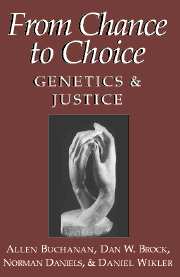Book contents
- Frontmatter
- Contents
- Preface
- CHAPTER ONE INTRODUCTION
- CHAPTER TWO EUGENICS AND ITS SHADOW
- CHAPTER THREE GENES, JUSTICE, AND HUMAN NATURE
- CHAPTER FOUR POSITIVE AND NEGATIVE GENETIC INTERVENTIONS
- CHAPTER FIVE WHY NOT THE BEST?
- CHAPTER SIX REPRODUCTIVE FREEDOM AND THE PREVENTION OF HARM
- CHAPTER SEVEN GENETIC INTERVENTION AND THE MORALITY OF INCLUSION
- CHAPTER EIGHT POLICY IMPLICATIONS
- APPENDIX ONE THE MEANING OF GENETIC CAUSATION
- APPENDIX TWO METHODOLOGY
- References
- Index
CHAPTER FIVE - WHY NOT THE BEST?
Published online by Cambridge University Press: 05 June 2012
- Frontmatter
- Contents
- Preface
- CHAPTER ONE INTRODUCTION
- CHAPTER TWO EUGENICS AND ITS SHADOW
- CHAPTER THREE GENES, JUSTICE, AND HUMAN NATURE
- CHAPTER FOUR POSITIVE AND NEGATIVE GENETIC INTERVENTIONS
- CHAPTER FIVE WHY NOT THE BEST?
- CHAPTER SIX REPRODUCTIVE FREEDOM AND THE PREVENTION OF HARM
- CHAPTER SEVEN GENETIC INTERVENTION AND THE MORALITY OF INCLUSION
- CHAPTER EIGHT POLICY IMPLICATIONS
- APPENDIX ONE THE MEANING OF GENETIC CAUSATION
- APPENDIX TWO METHODOLOGY
- References
- Index
Summary
HAVING THE BEST CHILDREN WE CAN
“Be All You Can Be,” the Army recruiting poster urges young men and women. Many parents share the sentiment. They want their children to be the best they can be. For many parents, their most important project in life is to pursue that goal, and they make sacrifices to see it happen. And why shouldn't parents aim to make their offspring the best they can be?
Of course, means matter. That is why we consider in this chapter whether parents should be free to use genetic intervention techniques to produce the best offspring they can. Posed this way, the question immediately raises many antieugenic hackles: Won't screening and selective abortion mean we eliminate many lives that are worth living? And won't it devalue the lives of people with disabilities? Anyway, who is to say what is the “best” (some parents have peculiar ideas)? Won't the economically and socially privileged be those best placed to pursue the “best”? Doesn't “best” for some mean worse for others? Isn't it wrong for parents to think of their children as something they design?
These objections deserve attention, and we will return to them shortly, but it is important to understand the presumption behind the original question. Shouldn't parents seek the best – even through genetics – for their offspring? Don't we expect them to?
What Could Be More Natural Than Parents Seeking the Best?
Parents are generally regarded as having permission, and some would say an obligation, to produce the “best” children they can.
- Type
- Chapter
- Information
- From Chance to ChoiceGenetics and Justice, pp. 156 - 203Publisher: Cambridge University PressPrint publication year: 2000
- 1
- Cited by



